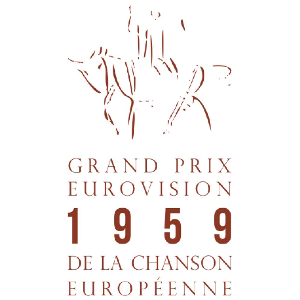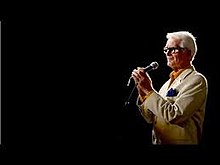
The Eurovision Song Contest 1959 was the fourth edition of the annual Eurovision Song Contest, held on Wednesday 11 March 1959 at the Palais des Festivals et des Congrès in Cannes, France, and hosted by French television presenter Jacqueline Joubert. Organised by the European Broadcasting Union (EBU) and host broadcaster Radiodiffusion-Télévision Française (RTF), the contest, originally known as the Grand Prix Eurovision de la Chanson Européenne 1959, was held in France following the country's victory at the 1958 contest with the song "Dors, mon amour", performed by André Claveau.

The Eurovision Song Contest 1960 was the fifth edition of the annual Eurovision Song Contest, held on Tuesday 29 March 1960 at the Royal Festival Hall in London, United Kingdom, and hosted by British television presenter and actress Catherine Boyle. Organised by the European Broadcasting Union (EBU) and host broadcaster the British Broadcasting Corporation (BBC), the United Kingdom was offered the rights to stage the contest after the Netherlands, which had won the 1959 contest, declined the opportunity after having organised the event in 1958.

The Eurovision Song Contest 1995 was the 40th edition of the Eurovision Song Contest, held on 13 May 1995 at the Point Theatre in Dublin, Ireland. Organised by the European Broadcasting Union (EBU) and host broadcaster Radio Telefís Éireann (RTÉ), and presented by Mary Kennedy, the contest was held in Ireland following the country's victory at the 1994 contest with the song "Rock 'n' Roll Kids" by Paul Harrington and Charlie McGettigan. It was the third consecutive contest to be held in Ireland – the first and only time in the history of the event that a country has hosted three editions in a row – and the second consecutive edition to be held in the Point Theatre in Dublin.
The United Kingdom held a national pre-selection to choose the song that would go to the Eurovision Song Contest 1967. It was held on 25 February 1967 and presented by Rolf Harris. Harris's weekly show had been the showcase for the five songs in the competition, which had been performed in successive weeks prior to the final. Harris himself would be the BBC's commentator for the final in Vienna.
The United Kingdom held a national preselection to choose the song that would go to the Eurovision Song Contest 1968.
The United Kingdom held a national preselection to choose the song that would go to the Eurovision Song Contest 1973.
The United Kingdom held a national pre-selection to choose the song that would go to the Eurovision Song Contest 1975.
The United Kingdom held a national preselection to choose the song that would go to the Eurovision Song Contest 1976.
The United Kingdom held a national preselection to choose the song that would go to the Eurovision Song Contest 1979. A Song for Europe 1979 was planned to take place at the Royal Albert Hall in London on 8 March.
The 1985 edition of A Song for Europe was held at the BBC Television Centre in Studio 1 on 9 April, hosted by a suited Terry Wogan. The theme music was Te Deum. The BBC Concert Orchestra under the direction of John Coleman as conductor accompanied all the songs, but despite performing live, the orchestra was off-screen, behind the set.
The United Kingdom participated in the Eurovision Song Contest 1986 with its entry "Runner in the Night" performed by the group Ryder. The song was chosen through the A Song for Europe national final which consisted of eight songs in 1986. At the Eurovision Song Contest 1986 held in Bergen, Norway, Ryder and the song placed seventh with 72 points.
Samantha Janus represented United Kingdom in the Eurovision Song Contest 1991 with the Paul Curtis-written song "A Message to Your Heart", which was placed 10th.
The United Kingdom selected their entry for the Eurovision Song Contest 1996 in Oslo, Norway with a new show, The Great British Song Contest. The winning entry was Gina G with "Ooh Aah... Just a Little Bit".
The United Kingdom was represented by Emma in the Eurovision Song Contest 1990 with the song "Give a Little Love Back to the World".

Bulgaria has participated in the Eurovision Song Contest 14 times since making its debut at the 2005 contest in Kyiv. The country's best result is a second-place finish for Kristian Kostov and the song "Beautiful Mess" at the 2017 contest also in Kyiv.

Yugoslavia participated in the Eurovision Song Contest 27 times, debuting in 1961 and competing every year until its last appearance in 1992, with the exceptions of 1977–1980 and 1985. Yugoslavia won the 1989 contest and hosted the 1990 contest.

Finland has participated in the Eurovision Song Contest 56 times since its debut in 1961. Finland won the contest for the first – and to date only – time in 2006 with Lordi and their song "Hard Rock Hallelujah". The country's best result before then was achieved by Marion Rung with the song "Tom Tom Tom" in 1973, which placed sixth.

Portugal has participated in the Eurovision Song Contest 54 times since its debut at the 1964 contest. Since then it has missed five contests. The contest is broadcast in Portugal by Rádio e Televisão de Portugal (RTP). Portugal won the contest for the first time in 2017 and hosted the 2018 contest in Lisbon.

The United Kingdom has participated in the Eurovision Song Contest 65 times. It first took part in the second contest in 1957 and has entered every year since 1959. Along with Sweden and the Netherlands, the UK is one of only three countries with Eurovision victories in four different decades. It is one of the "Big Five" countries, along with France, Germany, Italy and Spain, that are automatically prequalified for the final each year as they are the biggest financial contributors to the European Broadcasting Union (EBU). The British national broadcaster, the BBC, broadcasts the event and has, on multiple occasions, organised different national selection processes to choose the British entry. The United Kingdom has won the Eurovision Song Contest five times, and has finished as runner-up on a record sixteen occasions. The UK has hosted the contest a record nine times, four times in London and once each in Edinburgh (1972), Brighton (1974), Harrogate (1982), Birmingham (1998), and Liverpool (2023).

"Wonderful World" is a song written by Guy Fletcher and Doug Flett and first recorded and released by British singer Cliff Richard.








